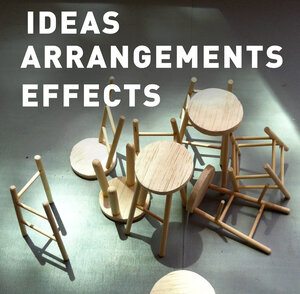
Ideas, Arrangements, Effects (IAE) by the Design Studio for Social Intervention (DS4SI) starts with a simple premise.
Ideas are embedded in social arrangements, which in turn produce effects.
This is, in itself, a very simple idea, but the power of the insights that can be achieved if you go along with this idea, is great indeed.
In the main the ideas that are examined in this book are the more unpleasant ones that humanity has managed to come up with. Racism, Misogyny, ideas about power which bolster Inequality. And the DS4SI put forward very convincing arguments, supported by examples of their own interventions, that we can design our way out of these societal ills.
In some ways this review is a taster for what is to come from the next issue of Ludogogy (Systems Thinking – due out in January), as this book is mostly definitely rooted in a Systems Design approach, fully acknowledging the complexity and interconnectedness of the ideas, arrangements and effects we see all around us. With that complexity, there often comes a sense of defeat, that some problems are simply too big and too difficult for us to find solutions.
IAE provides us with a framework and a set of tools to overcome this sense of defeat, firstly by understanding the social contexts one wishes to change and then by designing the new version one truly wants, either by intervening in existing arrangements or imagining new ones.
The use of the framework and tools is amply illustrated by example of DS4SI’s own interventions such as their Public Kitchen, Lighting the Bridge (a project exploring safety and geographical division) and “Is this chair own reason why…?” (a project looking at the arrangement of the chair and how it informs power relationships, among other things, in education).
Starting to Notice
On reading this book, one starts to notice ideas, arrangements and effects everywhere, and this increased awareness brings with it a heightened sense of opportunities for design. With regular use of the tools outlined in this book, you will definitely find that the ideas start to come, regularly and rapidly.
So, what does this have to do with games or gamification. In my opinion, there are two ways in which the ideas in this book can be used when designing games ‘for good’, but just as importantly when designing games for learning or even just for fun.
Games design can embrace the ideas in this book as a new tool when designing games to tackle social issues. There are a multitude of techniques and processes which can be brought to bear. These will help to create games which reveal the hidden arrangements all around us, allowing our players to make a start in redesigning their social and physical environments, to bring about a more equitable and kind society.
As well as this direct use of the tools in the book, we can also use it as a sanity check of our work in general. Even if the game you are designing is ‘just for fun’, the principles of IAE can help you to ensure that you are not bolstering ideas and arrangements which perpetuate effects which disadvantage and discriminate.
I can recommend this little book highly to anyone involved in design of any kind, not just games design. It is available for purchase at https://www.ds4si.org/bookshop, and please do that if you are able, because the proceeds will help DS4SI to continue their work.
It is also available via this Amazon link (which would also bring in some commission for Ludogogy)
Ideas Arrangements Effects is available on Amazon
But if the price of the book is beyond your means, DS4SI have also made it available for free in a number of locations including https://c4aa.org/2020/05/ds4si-has-a-new-book or on Scribd https://www.scribd.com/
- James Bore – The Ransomeware Game - 13th February 2024
- Ipsodeckso – Risky Business - 23rd January 2024
- Review – Luma World Games - 15th December 2023





Be the first to comment